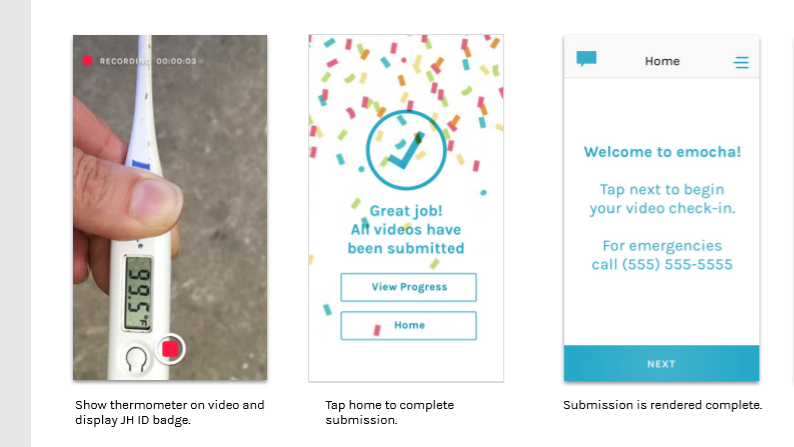
Emocha lets physicians track their temperature and record their symptoms in an asynchronous video chat.
Hospitals in Baltimore are rolling out a digital health startup’s tool to check up on healthcare professionals who many have potentially been exposed to Covid-19. Johns Hopkins Medicine and LifeBridge Health-affiliated hospitals are using a telehealth tool developed by Emocha.
Johns Hopkins Medicine had already been using Emocha’s software in its biocontainment unit, where patients with highly infectious diseases received treatment prior to the pandemic. Emocha has significantly expanded the program to help doctors, nurses and others treating patients with Covid-19.
“We thought, with the models of exposure and how this could ramp up in the U.S., we thought one of the most critical populations that we could help right away would be healthcare workers,” Emocha CEO Sebastian Seiguer said in a phone interview. “My wife is an infectious disease doctor. This is a very scary thing. We need our healthcare workers to be as safe as possible so they can take care of us and our families.”
Emocha monitors healthcare workers for 14 days after they’ve potentially been exposed to Covid-19. It asks them to fill out a form with their symptoms and temperature. The company also checks in with them using asynchronous video visits.
The company works with hospitals’ occupational health departments, getting a list of healthcare professionals that have been exposed to the virus and answering questions via a secure chat. Emocha’s team also triages cases, referring those with more severe symptoms to occupational health.

A Deep-dive Into Specialty Pharma
A specialty drug is a class of prescription medications used to treat complex, chronic or rare medical conditions. Although this classification was originally intended to define the treatment of rare, also termed “orphan” diseases, affecting fewer than 200,000 people in the US, more recently, specialty drugs have emerged as the cornerstone of treatment for chronic and complex diseases such as cancer, autoimmune conditions, diabetes, hepatitis C, and HIV/AIDS.
Seiguer said the company launched its Covid-19 tool 10 days ago, but it began scaling up staff about a month ago after the company was approached by Johns Hopkins’ infection control team. Two of Emocha’s advisors are infectious disease professors with Johns Hopkins University.
On Saturday, the company launched with LifeBridge Health, which operates five hospitals in the Baltimore area. The company is also in discussions with other hospitals, home care groups and urgent care centers.
Monitoring healthcare workers for symptoms is especially useful during a time when tests are still short in supply across the U.S., as labs face shortages in the swabs and reagents needed to run them. While the ideal method would be to test everyone that had been exposed, and later retest for potential false negative results, for most hospitals, that simply isn’t an option. On top of that, quarantining healthy doctors and nurses for 14 days means fewer people available to help treat patients.
“In the absence of really widespread testing, we have to go with what we know. What we know is someone who is symptomatic is more risky than someone who is asymptomatic,” Seiguer said. “As this crisis continues — hopefully it won’t be too long, but we know it’s not at its peak — we need to know who’s asymptomatic and who’s experiencing symptoms, so we can get rosters updated and healthcare workers back to work as quickly as possible.”
Seiguer also emphasized the importance of having another person on the line to check in and share words of encouragement.
“People are scared, right?” he said. “They like to know that somebody else knows about this and has their back. The support aspect is critical.”
This article has been updated with a newer image of Emocha’s system.
Photo credit: Emocha













